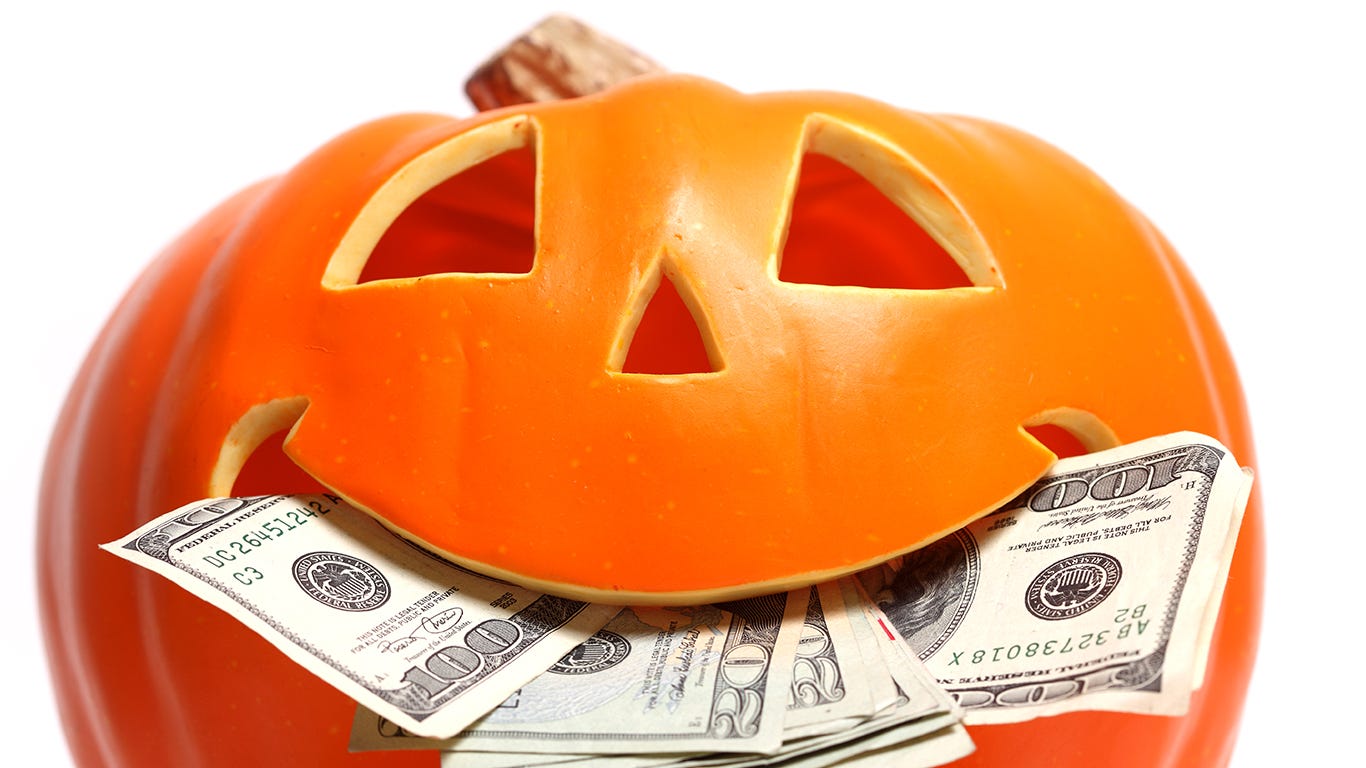Consumers are expected to spend a record $10.14 billion on Halloween this year, according to the National Retail Federation. That’s up from $8.05 billion last year when the Centers for Disease Control & Prevention suggested most avoid trick-or-treating.
The average consumer is expected to spend $102.74 on costumes, candy, decorations and greeting cards, $10 more than last year, according to the NRF’s annual survey of 8,061 consumers, conducted Sept. 1-8 by research firm Prosper Insights & Analytics.
Here are the numbers and ways you can save this Halloween:
Costumes:
Most of the spending will go to costumes: $3.32 billion, 27% more than last year and the most since consumers spent $3.35 billion in 2017, the NRF says.
Hands down the most exciting part of Halloween is the costumes! Who doesn’t love seeing babies dressed as fuzzy animals or a five-year-old running around cape flitting behind them as they declare they are a superhero? However, all these fun and games can come with a hefty price tag!
Ways you can save on costumes are instead of paying $40 for the ready-made stock in the stores, make your own! It can be fun gathering your materials and using imagination. And don’t forget, just like kids grow out of clothes, they also grow out of their Halloween costumes. Check with your friends and neighbors to see if they’ll let you borrow a costume this year.
Decorations:
It’s estimated that Americans will spend $3.17 billion on decorations this year!
Halloween décor can really take a chunk out of your budget. Gone are the days when one strategically carved pumpkin on the porch was sufficient. Now it seems like any good décor includes a variety squashes and gourdes surrounded by mums and ornamental signs welcoming fall. If decorating for Halloween is a must for you, try stretching your dollar by shopping at your local Dollar Tree. Another way to save is buying your pumpkins at a local grocery store instead of the pumpkin patches that usually have a much higher mark up. And if you have the space, a great way to save is storing and reusing décor from years past!
Candy:
Not far behind decorations spending for Halloween candy is expected to reach 3 billion this year.
Some neighborhoods get carloads of kids every but that doesn’t mean you have to buy barrels of candy. To save in this area skip the gourmet chocolate bars and grab a bulk bag of assorted candy instead. Be on the lookout for coupons and any two-for-one deals, and don’t feel pressured into getting the name brand candies! Oh, and once you run out of candy, turn the lights off. There’s no need to get egged!
It is also helpful to keep track of how many trick-or-treaters actually visit your house so you can plan for next year. There’s no need to overbuy and get stuck eating all the leftovers (unless that’s what you were hoping for).
A few more numbers:
Two-thirds of Americans (65%) plan to celebrate Halloween this year, compared to 58% in 2020, and just below the 68% who celebrated in 2019, the NRF says.
Households with children are more likely to celebrate Halloween (82%) than those with no children (55%). Homes with children will likely spend more: about $150, compared to $74 spent by those without children.
Favorite ways to celebrate include: handing out candy to trick-or-treaters (66%), decorating the house (52%), wearing costumes (46%), carving a pumpkin (44%), hosting or going to a party (25%).
Source: Mike Snider, USA TODAY, September 22, 2021 https://www.usatoday.com/story/money/shopping/2021/09/22/halloween-costumes-2021-candy-decorations-spending-record/5816767001/
Source: Ramsey Solutions, SEPTEMBER 28, 2021 https://www.ramseysolutions.com/budgeting/5-money-saving-tricks-for-happier-halloween
**Disclaimer: This material has been prepared for informational purposes only, and is not intended to provide, and should not be relied on for, tax, legal or accounting advice. You should consult your own tax, legal and accounting advisors before engaging in any transaction.


